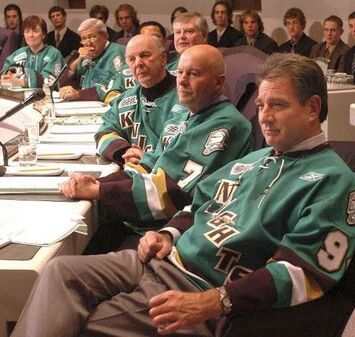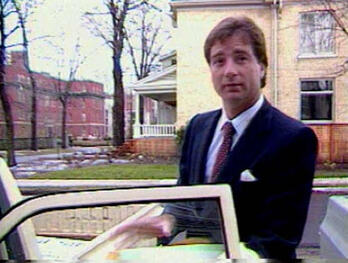 Gosnell [forefront] as Council salutes the London Knights Gosnell [forefront] as Council salutes the London Knights LONDON, ONTARIO - Only one year older than myself, when Tom Gosnell was elected mayor of London in 1985 at the age of 34, I doubt that I was the only member of that tiresome generation familiarly (and sometimes sneeringly) known as the Boomers who suddenly experienced a moment of slightly giddy uncertainty. (He had actually served seven years before that as an alderman but that hadn’t significantly registered on my consciousness.) Tom’s elevation to the city’s highest post could best be compared, I suppose, to the first time you find yourself entrusted to the care of a physician who’s roughly your own age or (perish the thought) even younger. It was a moment of realization that, ready or not, our lot was in charge now. Regardless of how ill-prepared we may have felt, we were now the responsible adults in the room. Were we really ready for this? And then with Gosnell’s too-early death from cancer in 2014, seven years ago this week at the age of 63, the opposite kind of knell was rung; telling us that our time of relinquishing was starting to get underway. “But I could’ve sworn that we were just getting the hang of how things work.” Again, were we ready? Had we attained sufficient wisdom and grace (and did we trust the rising generation enough?) to begin stepping away from the controls and letting younger, surer hands take it from here? As a workaday journalist throughout Tom Gosnell’s political career, I had occasion to interview him at least a dozen times and always found him refreshingly candid, thoughtful and generous with his insights and his time. Significantly, he wasn’t the least bit sniffy or put out by following his eight year stint as Mayor (1986-94) with seven more years as Controller and Deputy Mayor (2003-10). He was never voted out of office but stepped down of his own accord both times to attend to other concerns. And at the time of his death, Anne Marie DeCicco-Best was unstinting in her gratitude and praise for all the help he gave her in finding her feet as Mayor. I couldn’t help liking Tom Gosnell even though he wasn’t really my type of chap. For one thing, he was way too fond of sports and automobiles. He’d won city-wide acclaim back in high school as a quarterback for the Laurier Rams and then went on to play semi-professionally with the London Lords. At six foot three, he also had the stature to excel at basketball. In our very first interview, we somehow got talking about which bands we liked and as a preening bohemian dictator, I found his taste in music execrable. He loved The Eagles for goodness’ sake and I fear I might’ve gagged when he told me Carole King’s Tapestry was his favourite album of all time. And perhaps most disconcerting of all, Tom was a natural politician; the son of a City Councillor and Mayor, Fred Gosnell, who stepped down from the city’s top post for reasons of ill health mere weeks after being elected in 1972. Like most effective politicians, Tom Gosnell could and would talk to anyone. During a particularly hysterical patch early this century when certain city columnists were decrying the fact that some of our politicians got together in their off hours to talk shop, Tom was just about the only active Councillor who’d go on the record in favour of the practice, saying it was a great way for politicians to familiarize themselves with the complexities underlying certain issues and consider other perspectives. He insisted that such off-the-record conversations discouraged the development of warring factions on Council, fostered true collegiality and deepened each politician’s understanding on the issues they were elected to resolve. And as everything would still have to be hashed out on the floor of City Council for everyone to see, there was no reason to be getting freaked out that anybody was pulling a fast one. For much the same reasons, Tom lamented the deep-sixing of London’s Board of Control which gave Council four politicians whose mandate was to consider the best interests of the City over all and not just a specific ward. I never found Tom’s professional political patina so thick that it prevented me from making contact with the person underneath. In 2010 when I was working for The Voice of London and he was wrapping up his political career, he gave me a remarkable two-hour interview that was studded with great anecdotes, profound insights into the art of governance and expressions of love for his home town. I offer you some highlights from that interview here in grateful remembrance of the man.  Tom Gosnell (1951 - 2014) elected mayor at 34 Tom Gosnell (1951 - 2014) elected mayor at 34 ON DECIDING TO RUN FOR MAYOR: “I’d reached a point where it was either up or out. I didn’t want to remain as a Councillor. I took a long time thinking about it. I was only 34 at the time and I wasn’t married. People were saying, ‘You’re too young and there will be lots of opportunities later,’ but I didn’t want to stay part time in politics and part time in business. I wanted to really immerse myself in it. My father was not enthused by the idea but when he realized I was pretty determined to do it, then he was very supportive. The last day that I saw my father alive was the day after the election. He had stayed around to help with the campaign before heading south to Florida. The night of the election, I was over at Mike Smith’s house with my parents. We were trying to watch the election results and all the numbers were coming except for the Mayor’s race. It was stuck at the same reading for two and a half hours. I was just beside myself. It was like, ‘Put me out of my misery. Tell me I won or lost but just stop this.’ Then the results started to roll in again and I was getting a bigger lead and a bigger lead. I really knew I was Mayor when my father walked over, put on this sort of fedora hat that he liked to wear all the time, looked me right in the eye and said, ‘Mr. Mayor, I think it’s time to go downtown.’ “They were kind enough to put my picture in the paper the next day with my arms around my mom and dad. And he passed away three months later in Florida. He used to tell me, ‘Politics is a job that the longer you’re in, the closer you come to losing.’ He said, ‘It’s not a career.’ He couldn’t understand people that are 30, 40, 50 year politicians. He never wanted to do that. As a rule people finally build up enough disagreement with you on some issues that you’re in trouble. He said, ‘Be sure you vote for something you believe in. You may lose because of it but at least you’ll have lost for something you believed in; not something you sat on the fence about.’ And I’ve always tried to do that. I don’t pretend that my ideas are the only right ideas but at the end of the day, if people truly believe - even if they disagree with you - that you acted for what you thought was the best interest of the community and explained it to them, they still might be mad but they’re not going to necessarily not vote for you. Not because of one or two things. They’re sophisticated enough to know that a city has many, many facets.” ON THE 1992 ANNEXATION THAT QUADRUPLED THE CITY’S SIZE: “That was a huge issue and I was very, very aggressive in getting that concluded. To me that was building the basis of what London was going to be for generations to come. If we had not been successful with annexation we would have ended up with all kinds of cities sprouting up around London and you would have had some of the enormous amalgamation problems you see across the province in places like Ottawa and Hamilton and Toronto.” DID HE EVER WANT TO PUNCH PEOPLE’S TEETH OUT WHEN VOTES DIDN’T GO HIS WAY? “The short answer is ‘no.’ And I mean, what alternative is there? If every politician allowed one or two issues to over-ride everything else, then you would just be in chaos as a city. Do you go home and maybe have a drink or kick the dog? Of course you do, right? I mean, what’s the matter with these people? Why can’t they see things more clearly and my way?” WHAT MAKES LONDON GREAT? “I went to this event when I was three or four years into the job as mayor and I saw three East Indian girls. They were sisters and I found out they were students at Western and they were volunteering as candy-stripers. I went over and said, ‘Hi,’ and ‘Thank you for getting involved in the community,’ and I said, ‘Are you from London?’ and they said, ‘No, we’re from Toronto, around the Downsview area.’ One was in second year and the other two were in first year. And I said, ‘If you don’t mind my asking, you know, you’re new to London, you’re going to Western, I’m sure that’s a pretty heavy load. Why are you doing this?’ And they said, ‘Well, Mr. Mayor, in our community and in our family, this is how we give back to society. And wherever we live, this is what we choose to do to make our community better.’ “I almost started to cry. I’m almost crying now, remembering them. One of the reasons why we are so successful as a community has nothing to do with City Council. It’s got everything to do with the community itself caring enough to get involved.”
2 Comments
Jim Chapman
6/12/2021 12:38:27 pm
Reply
Mark Richardson
6/12/2021 12:40:26 pm
Thanks, Herman:
Reply
Your comment will be posted after it is approved.
Leave a Reply. |
HERMANEUTICS
If you would like to contribute to the ongoing operations of Hermaneutics, there are now a few options available.
ALL LIFE IS A GIFT :
THE IMPORTANCE OF TRADITION :
Archives
June 2024
Categories
|

 RSS Feed
RSS Feed